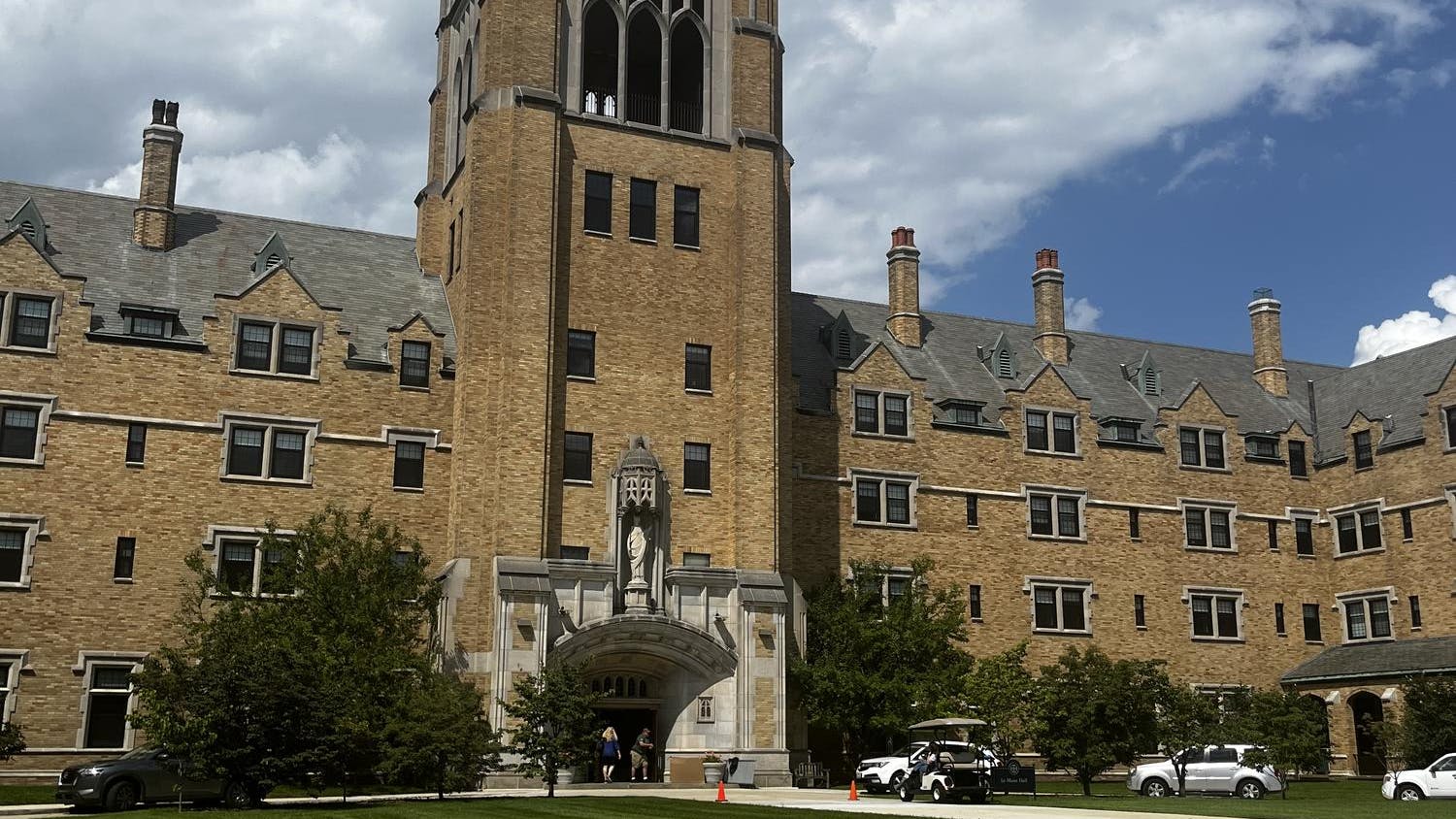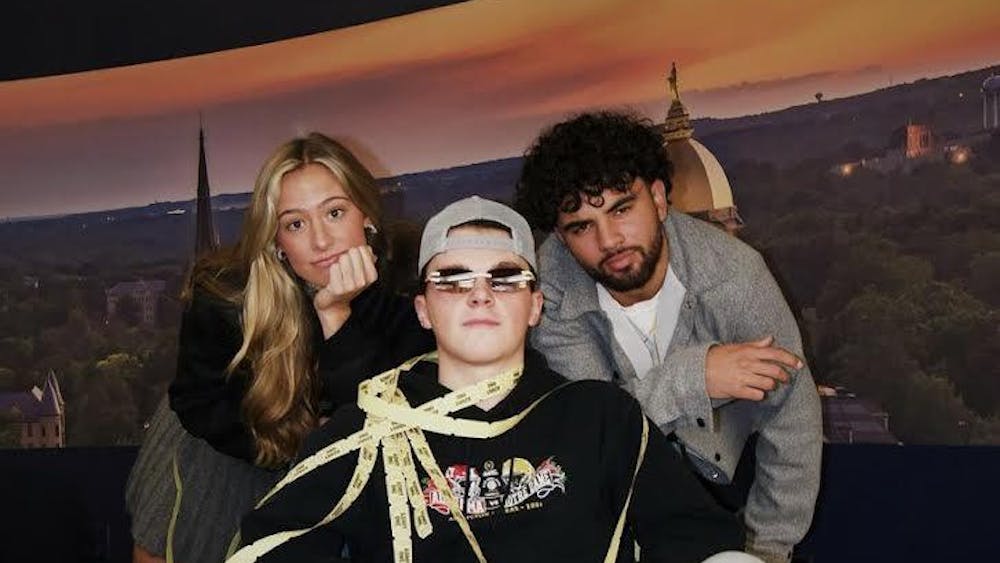Judge Rosemarie Aquilina emerged as a fierce advocate for victims of all forms of sexual abuse in 2018, when she sentenced convicted serial child molester and former USA Gymnastics national team doctor and Michigan State University osteopathic physician Larry Nassar to 40 to 175 years in prison for the sexual abuse of minors.
Video from within the courtroom shows Aquilina, a streak of magenta visible in her dark hair, delivering her final statements to Nassar following his sentencing. In the clip, Aquilina reads aloud excerpts from a letter written by Nassar, in which he claims to have been a “good doctor” and that the media had “convinced [the victims] that everything I did was wrong and bad.” Aquilina concludes the reading with a measured stare, then tosses Nassar’s written statement to the bench, eliciting gasps from those watching in the court room.
Aquilina, as well as Grace French, Louise Harder and Melissa Hudecz, three “sister survivors” of abuse by Nassar, visited Saint Mary’s Sunday night for a screening of the HBO documentary “At the Heart of Gold: Inside the USA Gymnastics Scandal” and a discussion panel.
Before the screening, Aquilina, French, Harder and Hudecz sat down with Belles Against Violence Office (BAVO) coordinator Liz Coulston, the BAVO Student Advisory Committee and representatives from the Saint Mary’s Athletic Department to discuss sexual violence prevention, intervention and response.
In her introduction of the panelists, Coulston said while the Nassar case received a lot of attention in the media, focus should also be turned towards what the sister survivors have done in the year following the trial.
“[The sister survivors] have kind of said that the case was only the beginning, and now they’re really working to educate the public and create advocacy around this issue on how to better protect our children and our athletes,” Coulston said. “We can’t change these issues of sexual violence and relationship violence and stalking without talking about them. So we’re creating these safe spaces for us to talk about them and learn about them in a healthy, safe way.”
At the start, only six survivors had agreed to use their name when they testified. As the number of those willing to testify on public record grew and more victims came forward, the group grew to 156.
Aquilina said she named those who testified in the trial the “sister survivors” because of the close relationships she watched form and flourish within the courtroom, and witnessed the empowerment the women gave to themselves and each other.
“When they came in — and you can see them on the screen — they said, ‘Your honor, may I address the defendant?’,” Aquilina said. “And many of them started out the same way: ‘I am not a number. I am a name.’ I watched them grow and become empowered and then I spoke to them and … I could literally feel them drop their pain and then walk to the back of the room and be joined by others — and I knew that they did not all know each other,” she said. “They were hugging and crying together. I was watching a family be formed. I could feel it. I mean, if you were in that courtroom, you felt this energy of these people with this common crime that was so vile against them joining together, empowering each other and coming together in strength and I started calling them sister survivors, an army of sister survivors. And it just stuck because that’s what they were.”
The survivors began to lean on each other for support, Aquilina said, finding strength in a group of strangers who would later become as close as biological sisters.
“They started supporting each other, one after the other and aligning themselves together,” she said. “It was magnificent. It was almost biblical. I mean, they joined together as a force against this crime. And I couldn’t help but call them sister survivors, because they became sisters in those moments.”
In 2018, sister survivor Grace French, a 22-year-old woman from Ann Arbor, Michigan, founded The Army of Survivors, a nonprofit organization with the mission of bringing “awareness, accountability, [and] transparency to sexual violence against athletes at all levels.”
Louise Harder, survivor and board director and strategist for The Army of Survivors, said this sisterhood was born out of a shared understanding and compassion for each other.
“There’s some unspoken language between survivors,” she said. “We didn’t have to rehash the story. We didn’t have to say anything at all, yet, the people next to me knew exactly what’s going on and that has continued to be a bond. There are still sister survivors that I am in fairly frequent contact with and still reach out to. They’re lasting bonds, and again, like I said, you don’t have to say anything. It’s just kind of this unspoken, unwritten type of relationship.”
Sister survivor Melissa Hudecz, an occupational therapist and the reporting and research chair for The Army of Survivors, said these relationships were built under extreme circumstances, within a short period of time.
“The intensity happens so fast,” she said. “People you hardly know, all of a sudden, you realize know all of your deepest secrets, thoughts, and it’s just unspoken support for each other.”
Aquilina, who also serves as a board director for The Army of Survivors, said she is traveling the world to discuss the first steps to fixing “a broken legal system” and a “broken medical community,” while giving a voice to those who feel silenced.
“We need to go back to basics and that’s really what I’m talking about. Changing the basics, changing the language, doing what we do in the military when there’s a problem: retrain,” Aquilina said. “Making sure that everyone, from the least-ranked soldier to the top, is trained and educated. … And I’m not just saying this about sexual assault. There’s domestic violence, there’s physical violence, there'’s emotional violence, there is child abuse, there is the sex trade industry, sex trafficking, sexual assault, all of these things, and we need to start training people. I’m talking about how you recognize grooming, how you recognize if someone’s being sold, how you converse with people. So I’m trying to use my power to give voice and retrain us.”
Athletes are trained to work through the most incredible forms of pain, Aquilina said, fighting through broken bones and torn muscles. The fact that sexual abuse has touched even the strongest of women is a testament to how pervasive the issue has become, she said.
“I really think that as much as a tragedy as this has been, it’s also been a gift to the world to say this can happen to even the strongest of us,” she said. “And if this can happen to us, it can happen to you, it can happen to your best friend. Let’s keep the conversation going. Let’s eradicate this together.”
When asked about the impact of speaking to students at a women’s college such as Saint Mary’s, Aquilina said she was happy to be connecting with young women seeking change.
“There’s no corner in the world where we shouldn’t be having this conversation,” Aquilina said, “And what better place than a university where we have young minds who are eager to learn and to go out in multiple different professions, and talk about change, and teach change and work within a system for change as part of eradicating. I think that’s really the goal of the army of sister survivors and of all of the survivors.”
Though Aquilina invited Saint Mary’s students and administrators into an important conversation, she said this discussion should ultimately extend beyond the College campus. The sharing of the sister survivors’ stories not be limited to female audiences, she said.
“So [Saint Mary’s] is the perfect place,” Aquilina said. “Every university ought to watch this film, every university ought to listen to these survivors. And it’s not just about women. This is an all-women’s university. This is a conversation for men, women, boys and girls. They all ought to be part of the equation. If we say that this is a women’s issue, then we are doing what men have done to us to shut us up and shut us down. We need to be inclusive, not exclusive, and include them in the equation to eradicate this once and for all.”













